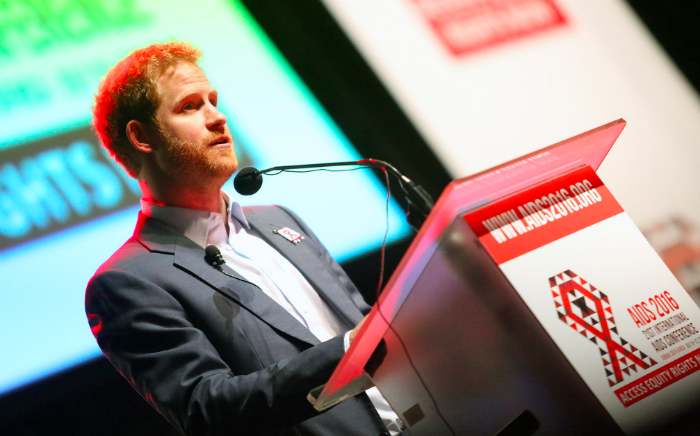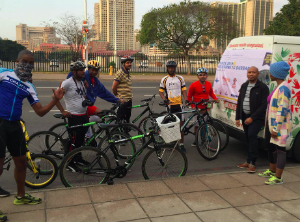AIDS: the risk of complacency
International AIDS Conference highlights risks in the face of a resurgent HIV. By Alan Bain
 Prince Harry and Elton John shared the platform to much applause at the bi-annual International AIDS conference in Durban bringing a passionate appeal for young people to be included in the AIDS response.
Prince Harry and Elton John shared the platform to much applause at the bi-annual International AIDS conference in Durban bringing a passionate appeal for young people to be included in the AIDS response.
'What I believe', said the Prince, 'is that it is time for a new generation of leaders to step forward; AIDS has drifted from the headlines (and) we risk a drift of funding and of action to beat the virus.
'We now face a new risk – the risk of complacency.'
Musician Elton mirrored the remarks of the young prince, comparing himself to a mature Stilton cheese who now needs to stand aside for younger people. Or as he put it in his own humorous style; he has become “Stilton John”.
Capping the week of a conference that brings together over 18,000 health professionals advocates and activists for the bi-annual International AIDS Conference in South Africa’s city of Durban, the remarks resonated with many of the themes of the week.
Michael Sidibe of UNAIDS spoke in an early session of his fear for the future; 'complacency is the new conspiracy, our progress is extremely fragile. If we don’t act now we risk resurgence. AIDS 2016 must mark the commitment to finish what we started and Fast-Track the end of AIDS.'
He had every reason to sound a warning with the budget to achieve UNAIDS goal of 90-90-90 (90 per cent reduction of new infections, 90 per cent on ART treatment, 90 per cent will know their HIV status) facing an unprecedented drop at the very point it is required to rise. It needs to reach UNAIDS estimate of a $7.2 billion of additional funding by 2020.
The “Fast Track” to end AIDS by 2030 was a continual theme, and has consequences for Faith Based groups who work in the most infected area of Sub-Saharan Africa and carry much of the burden for AIDS care. The Archbishop of Cape Town, Thabo Makgoba spoke of the 'God who wants us to embrace justice - and our goal to make places of worship safe and accessible for those with HIV and AIDS.'
When quizzed on how worn out and tired clergy and churches are to achieve this and the difficulty of them achieving even more, he acknowledged this was true, but pointed to a 'spiritual role where they would find their resources.' However, in September 2015, PEPFAR (Presidents Emergency fund for AIDS relief) and UNAIDS launched a two-year initiative, with a $2 million commitment for the first year to 'strengthen the capacity of faith-based leaders and organizations to advocate for and deliver a sustainable HIV response'.
The pursuit of a vaccine or cure is always on the agenda at AIDS conferences but the elusive cure always seems to be 10 years away, in part because of the HIV virus’ extraordinary capacity to mutate and evade antibodies that might block it. New vigour has been urged in the search for a new drug with an optimistic claim that the long and challenging road has begun to take some promising turns, with new large-scale human trials.
The research is not without ethical problems; Jennifer Power of La Trobe University Australia has been conducting research on AIDS trials. She pointed out that the word 'cure' in itself was difficult and could mean eradication of the disease or just remission, as she spoke about the need for researchers to clarify and minimise risk in altruistic volunteers who might be asked to reduce or stop their ART.
There were warnings about groups who are missed out. One such group, surprisingly, are infants and children half of whom die within two years of contracting the disease. Assistant Secretary General of the UN Dr Loures said 'all the UN’s targets are aimed at 2020 but for children we have had to reduce the target by two years. Children cannot wait, HIV is coming back and it’s more selective. It increasingly follows areas of conflict, with rape used as a weapon of war.'
There was a forewarning about a 'teen boom' as the world faces a resurgence in HIV infections. Many of these teens caught the infection from their mothers while they were in the womb, and are now coming of age. Unless action is taken now, the surge in adolescents carrying the infection means the epidemic could spiral out of control again.
 Among all the myriads of NGO’s and community groups represented at the conference, 'Hope Riders' was one of the most unusual: a group of Indians from Hyderabad whose own family were stricken by HIV determined to raise awareness by using their bicycles.
Among all the myriads of NGO’s and community groups represented at the conference, 'Hope Riders' was one of the most unusual: a group of Indians from Hyderabad whose own family were stricken by HIV determined to raise awareness by using their bicycles.
Following a dream indicating he would recover, one HIV positive member of the family converted from Hinduism to Christianity. He now heads up the Hope Riders who take cycle rides to AIDS events spreading the message of HIV care to communities as they ride. This year six of them cycled 600 kms in three days from Johannesburg to Durban.
The next Aids conference is in Amsterdam in 2018 and Hope Riders plan to cycle from Morocco to the Netherlands, inviting others to join them. Perhaps Prince Harry, as part of the new generation called to lead in the epidemic, could lead the way.
The Revd Alan Bain is vicar of St Philip and St James Church in Bath and Chairs the Christian HIV/AIDS Alliance
Baptist Times, 22/07/2016